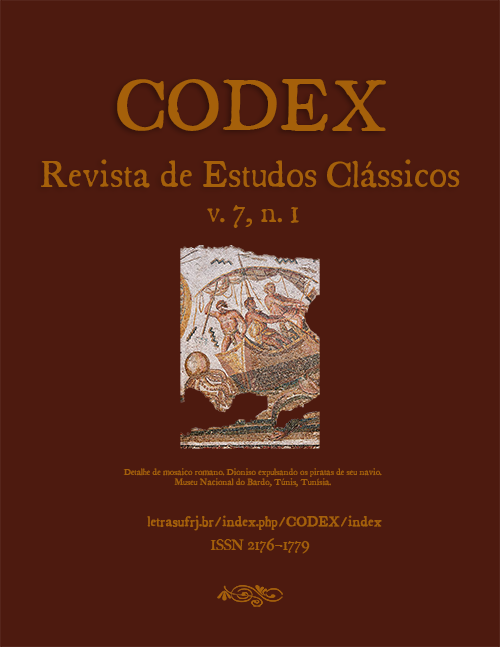Estrutura e unidade da primeira parte das Helênicas de Xenofonte
DOI:
https://doi.org/10.25187/codex.v7i1.23713Palabras clave:
Helênicas, Xenofonte, historiografia composição, unidade temática,Resumen
Considerada, muitas vezes, uma obra tendenciosa e cheia de lacunas, as Helênicas apresentam uma visão dos eventos ocorridos na Grécia a partir do olhar de Xenofonte. A narrativa das Helênicas cobre os eventos ocorridos na Grécia do ano 411 a 362 a.C., e a cisão estética e temática em 2.3.10 tem levado muitos autores a analisar as diferenças entre as duas partes da obra como resultado de ela ter sido escrita em dois momentos da vida de Xenofonte. Esse posicionamento conduziria o estudioso a fazer uma leitura distinta entre as duas partes, relegando à obra um caráter excessivamente episódico. Tomando um ponto de vista literário, sem julgamentos quanto à validade da informação histórica nela narrada, e partindo da hipótese de uma escrita contínua efetuada já no final da vida de Xenofonte, propomos uma leitura que visa compreender a construção da narrativa, buscando uma unidade temática e estrutural da obra.
Descargas
Citas
ANDERSON, J. K. Xenophon. London: Bristol Classical Press, 2008
ARISTÓTELES. Virtudes e vícios. Tradução de M. Reus Engler. Kriterion. Belo Horizonte, vol.55 nº130, Dec. 2014. pp.739-746.
BROWNSON, C. L. Hellenica I-II. Londres; Cambridge; Massachussets: Loeb Classical Library, 1968.
CHANTRAINE, P. Dictionnaire étymologique de la langue grecque. Paris: Klincksieck, 2009.
COULANGES, F. de. La ciudad antigua. Prólogos de Carlos García Gual. Traducción de Alberto Fano. Madrid: Edaf, 2006.
DELEBECQUE, É. Essai sur la vie de Xénophon. Paris: Librairie C. Klincksieck, 1957.
DILLERY, J. In: XENOPHON. Anabasis. Trad. Carleton L. Brownson, revisada por John Dillery. Cambridge; London: Harvard University Press, 2001. Loeb Classical Library.
DIONISIO DE HALICARNASO. Sobre la imitación. In: _____. Tratados de crítica literaria. Trad. Juan Pedro Oliver Segura. Madrid: Gredos, 2005.
DOVER, K. J. Greek popular morality. In the time of Plato and Aristotle. Oxford: Basil Blackwell, 1974
GRAY, V. J. The character of Xenophon’s Hellenica. Baltimore: John Hopkins University Press, 1989.
______. Continuous History and Xenophon, Hellenica 1-2.3.10. The American Journal of Philology, vol. 112, nº2. 1991.p. 201-228.
HATZFELD, J. Notice. In: XÉNOPHON. Helléniques. Paris: Les Belles Lettres, 1973. p.5-27.
HUTCHINSON, G. Xenophon and the art of command. London: Greenhill Books, 2000.
LEÃO, D. Matéria religiosa: processos de impiedade (asebeia). In: LEÃO, D.; ROSSETTI, L.; FIALHO, M. do C. G. Z. (Eds.). Nomos: Direito e Sociedade na Antiguidade Clássica. Coimbra: Imprensa da Universidade de Coimbra; Madrid: Ediciones Clásicas, 2004. p.201-226.
LESKY, A. História da Literatura Grega. Trad. de Manuel Losa. Lisboa: Fundação Calouste Gulbenkian, 1995.
McLAREN, M. A supposed lacuna at the beginning of Xenophon’s Hellenica. The American Journal of Philology, vol.100, nº2, 1979, p.228-238.
McLAREN Jr, M. On the composition of Xenophon’s Hellenica. The American Journal of Philology, vol.55, nº2, 1934a, p.121-139
______. On the composition of Xenophon’s Hellenica. Pt.II. The American Journal of Philology, vol.55, nº3, 1934b, p.249-262.
NIEBURH, B. G. Über Xenophons Hellenika. Rheinisches Museum 1. 1827, p.194-8.
POLIBIO. História Programática. Livros I a V. Tradução, Introdução e Notas de Breno Battitin Sebastiani. São Paulo: Perspectiva; Fapesp, 2016.
RAHN, P. J. Xenophon’s developing historiography. Transactions and Proceedings of the American Philological Association, 1971. Vol. 102, p.497-508.
SAMOYAULT, T. A intertextualidade. Tradução Sandra Nitrini. São Paulo: Aderaldo & Rothschild, 2008.
STRASBURGUER, G. Xenophon, Hellenka. Griechisch-deutsch (Tusculum), much, 1970.
THOMAS, D. In: STRASLER, R. B. The Landmark Xenophon's Hellenika. Translated by John Marincola with an Introduction by David Thomas. New York: Pantheon Books, 2009.
TUCÍDIDES. História da Guerra do Peloponeso. Trad. De Raul M. Rosado Fernandes e M. M. Gabriela P. Granwehr. Lisboa: Fundação Calouste Gulbenkian, 2010.
TUNÕN, O. G. In: JENOFONTE. Hellénicas. Introducción, traducción y notas de Orlando Guntiñas Tuñon. Madrid: Gredos, 1977.
TUPLIN, C. The Failings of Empire. A reading of Xenophon Hellenica 2.3.11-7.5.27. Stuttgart: Franz Steiner Verlag, 1993.
WHITE, H. Meta-história: a imaginação histórica do século XIX. Tradução de José Laurêncio de Melo. São Paulo: EDUSP, 1995.
XENOFONTE. A educação de Ciro. Tradução de Jaime Bruna. São Paulo: Cultrix, 1965.
XÉNOPHON. Helléniques. Tome I (Livres I-III). Texte établi et traduit par J. Hatzfeld. Paris: Les Belles Lettres, 1973.
______. Helléniques. Tome II (Livres IV-VII). Texte établi et traduit par J. Hatzfeld. Paris: Les Belles Lettres, 1965
XENOPHON. Hellenika. Tradução de John Marincola. New York: Anchor Books, 2009.
Descargas
Publicado
Cómo citar
Número
Sección
Licencia
A Codex - Revista de Estudos Clássicos utiliza uma licença Creative Commons - Atribuição-NãoComercial 4.0 Internacional.
Os autores dos trabalhos aprovados autorizam a revista a, após a publicação, ceder seu conteúdo para reprodução em indexadores de conteúdo, bibliotecas virtuais e similares.
A revista se permite o uso dos trabalhos publicados para fins não comerciais, incluindo o direito de enviar o trabalho para bases de dados de acesso público.










